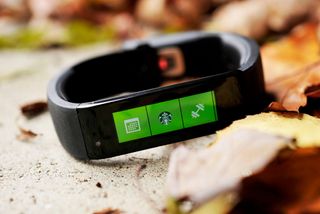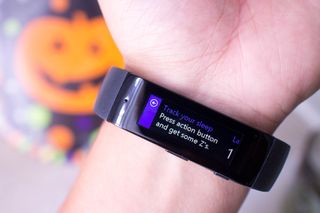Band is 'a real pivot change' for Microsoft as they take on Google and Apple

The Microsoft Band seems to have come out of nowhere from Redmond, but rumors of such a device in development have been circulating for some time. Indeed, building and researching the health tracker began nearly three years ago through the Xbox team's work on Kinect and motion control. That should tell you that the Band's hardware was in no way rushed.
However, it does seem that Microsoft jumped early on the release of the Band in order to make a splash in the market. In an article on the Seattle Times, Microsoft project manager Matt Barlow commented on the opportunity for the company to jump into the burgeoning health and technology business.

"This is a real pivot change for us. We talked with Satya quite a bit about it and said, 'Hey, we can wait for a year to two years and try to line everything up or we can say what's most important.' ''
The lining up part refers to the lack of proper integration into Microsoft's other businesses, including the Xbox One. As such, the software end of the Band is a bit premature, but Microsoft clearly saw the 2014 holiday season as the right time to pounce, regardless if the Band was ready for wide scale release.
Barlow also comments on how Microsoft was more interested in getting the device out into people's hands (or perhaps on their arms) to understand better exactly what people wanted from such technology:
"Getting people using it and providing feedback is going to shape what the bigger and bolder experiences are going to be, versus having a bunch of people in a room taking a guess about things,"
This change in product execution is very different from the past, where Microsoft took their time to get to market, often behind their competitors (hello, Zune). Windows Phone and Windows 10, each with their own 'preview program', demonstrates that Microsoft is now more interested in working with customers rather than "a bunch of people in a room taking a guess about things".
The article additionally affirms that the Band is meant as a demonstration device for Microsoft's new Health platform, an analysis I put forth over the weekend. Seattle Times writer Brier Dudley observes that:
"So instead of just launching another software platform to gather and crunch health and wellness data, and hoping that partner companies build nice devices to show it off, Microsoft also built a slick, flagship device and launched it alongside the software platform."
Undeniably the co-release of the Band made Microsoft health ambitions that much more tangible to consumers and other companies. As I noted though, Microsoft is trying to walk a fine line by introducing the Band to consumers while trying to woo companies like Fitbit and Jawbone to license their hardware sensor array and Azure powered Health platform.
Get the Windows Central Newsletter
All the latest news, reviews, and guides for Windows and Xbox diehards.
I would argue that the Band's hardware is quite complete at this point, but the software and cloud ambitions have yet to gestate fully. As such, Microsoft is likely to see how customers are using their Band in the coming months and adapt the software to better suit what people want. Sensors like the one for galvanic skin response have yet to be realized, and features like automatic Sleep mode detection are on their way.
In other words, Microsoft is just getting started but their foundation is set.

Daniel Rubino is the Editor-in-chief of Windows Central. He is also the head reviewer, podcast co-host, and analyst. He has been covering Microsoft since 2007, when this site was called WMExperts (and later Windows Phone Central). His interests include Windows, laptops, next-gen computing, and watches. He has been reviewing laptops since 2015 and is particularly fond of 2-in-1 convertibles, ARM processors, new form factors, and thin-and-light PCs. Before all this tech stuff, he worked on a Ph.D. in linguistics, watched people sleep (for medical purposes!), and ran the projectors at movie theaters because it was fun.
